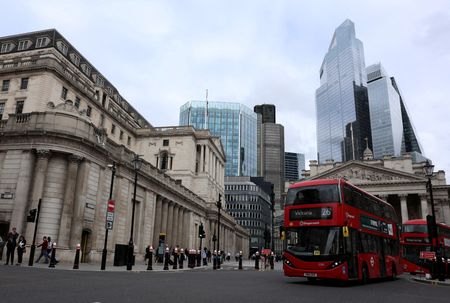By David Milliken
LONDON (Reuters) -Some businesses that operate in the British government bond market have made only limited preparations for a future crisis, potentially increasing the need for a bailout, Bank of England policymaker Jonathan Hall warned on Thursday.
Hall, an external member of the BoE’s Financial Policy Committee and former fund manager and Goldman Sachs partner, said there was a risk of a repeat of the 2008 financial crisis where the public had to bail out banks to avoid an even bigger financial crash.
Tighter regulation of banking since then had led risk-taking to shift to less-regulated hedge funds and money market funds based outside Britain, he said.
“There are non-bank financial institutions who are increasingly important to the functioning of systemic markets like gilts but are outside of the UK regulatory perimeter and have low levels of self-insurance,” Hall said in a speech to the Confederation of British Industry.
“If the public perceives that a market intervention ends up supporting these firms in stress, then the public outcry seen in the global financial crisis could be repeated but targeted against these non-banks,” he added.
On Tuesday, BoE Governor Andrew Bailey said the recent collapses of U.S. auto parts maker First Brands had echoes of the start of the global financial crisis. The BoE has also warned that AI speculation was pushing up share prices in a way similar to the dotcom bubble at the start of the millennium.
“Pricing is quite optimistic,” Hall said.
BOE INTERVENED IN BOND MARKET IN 2022
The BoE bought 19.3 billion pounds ($25.9 billion) of British government debt in 2022 after bond prices slumped after Prime Minister Liz Truss’ budget proposals. Hall said it was justifiable at the time as it was not reasonable to have expected funds to prepare for such a big move.
Since then, Hall said the BoE had taken measures to design market support mechanisms that only helped non-bank firms which were well regulated – such as pension funds, liability-driven investment funds and insurers.
But that would not always be sufficient in a crisis, and the next approach was to ensure that any BoE intervention was priced and timed in a way that excessively risky firms failed before the BoE intervened, he added.
However, continued international cooperation was also needed to ensure foreign businesses active in British markets were appropriately regulated, he said.
“It would be worrying if this important work to build resilience were threatened by reduced global cooperation, as this would unfairly shift the cost of insurance from overseas firms to UK institutions and the UK public,” he said.
($1 = 0.7451 pounds)
(Reporting by David Milliken; Editing by Toby Chopra)











